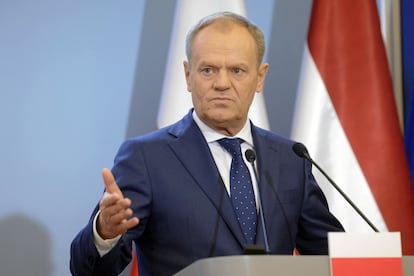The European Union moves to end standoff with Poland over anti-EU policies and begins to release billions in funds
The move is an important reward for Polish Prime Minister Donald Tusk, who has sought relentlessly since taking office in December to overturn measures enacted by the previous conservative government

The European Union took a major step Thursday in ending its standoff with member state Poland, saying it would start releasing billions of euros that were frozen over what the bloc said were the previous Polish government’s backsliding on democratic principles.
The move is an important reward for Polish Prime Minister Donald Tusk, who has sought relentlessly since taking office in December to overturn measures enacted by the previous conservative government. Beyond its political significance, it opens the way for up to 135 billion euros ($145 billion) in EU aid to go to Poland over the coming few years.
The decision cements a sea change in relations. Both sides had openly clashed after the stridently nationalist Law and Justice party came to power in 2015 and implemented reforms that critics said placed Poland’s judiciary under political control. The EU threatened to suspend Poland’s EU voting rights and also blocked its access to EU funds.
“Today is a landmark day for Poland,” said EU Commission Vice President Valdis Dombrovskis. “Thanks to its efforts to restore the rule of law, we are now able to unlock access” to a slew of funds that help EU nations recover from the Covid-19 crisis and help their economies rise to the standards of wealthier member nations.
Under complicated EU bookkeeping rules, Poland could receive over the next weeks the first 600 million euros ($650 million) in real cash from a 75 billion euro ($80 billion) aid pot that had been blocked. More funds will be transferred once Poland sends in outstanding paperwork from projects. A 6.3 billion euro ($6.8 billion) disbursement from a 60 billion euro ($65 billion) program to boost the recovery from the Covid-19 pandemic downturn should also be released soon.
In Warsaw, Deputy Foreign Minister Andrzej Szejna said the release of the funds means that Tusk had won back the EU’s confidence in Poland.
“Today’s news is very important for us. It’s the result of the efforts taken by the current government, which tries to be effective,” Szejna said.
Szejna said the availability of the funds will have an impact on the economy through investment and may contribute to reducing Poland’s unemployment rate, currently at 5.4%.
Tusk’s election victory last October was essential in achieving the change. The Commission has now acknowledged that sufficient efforts to resolve the issues have been made for it to start releasing the funds. If there is no full follow-through by Poland, restrictive measures could be reimposed.
EU Vice President Vera Jourova showed confidence in Tusk’s policies, saying, “Today we turn a page on the rule of law issues with Poland as we recognize the important strides made by the government.”
Poland’s pro-European coalition of three center-left parties led by Tusk won parliamentary elections on Oct. 15 and took over in December, succeeding the Law and Justice party that had ruled for eight years and introduced changes to the justice system, reproductive rights and the media that put Poland increasingly on a collision course with the EU.
The breakthrough in the standoff came after Polish Justice Minister Adam Bodnar presented an “action plan” to European officials which outlined draft legislation. EU officials also stressed that some of the proposals in the Polish plan can’t become law without the approval of President Andrzej Duda, who is a staunch ally of the Law and Justice party. His term runs until 2025.
Despite such domestic political challenges, the EU decided there was enough positive legal thrust to start releasing the funds.
The money will be coming from the EU’s Next Generation fund meant to help the bloc’s members recover from the Covid-19 pandemic downturn and also from a cohesion fund that supports infrastructure development.
Sign up for our weekly newsletter to get more English-language news coverage from EL PAÍS USA Edition
Tu suscripción se está usando en otro dispositivo
¿Quieres añadir otro usuario a tu suscripción?
Si continúas leyendo en este dispositivo, no se podrá leer en el otro.
FlechaTu suscripción se está usando en otro dispositivo y solo puedes acceder a EL PAÍS desde un dispositivo a la vez.
Si quieres compartir tu cuenta, cambia tu suscripción a la modalidad Premium, así podrás añadir otro usuario. Cada uno accederá con su propia cuenta de email, lo que os permitirá personalizar vuestra experiencia en EL PAÍS.
¿Tienes una suscripción de empresa? Accede aquí para contratar más cuentas.
En el caso de no saber quién está usando tu cuenta, te recomendamos cambiar tu contraseña aquí.
Si decides continuar compartiendo tu cuenta, este mensaje se mostrará en tu dispositivo y en el de la otra persona que está usando tu cuenta de forma indefinida, afectando a tu experiencia de lectura. Puedes consultar aquí los términos y condiciones de la suscripción digital.








































